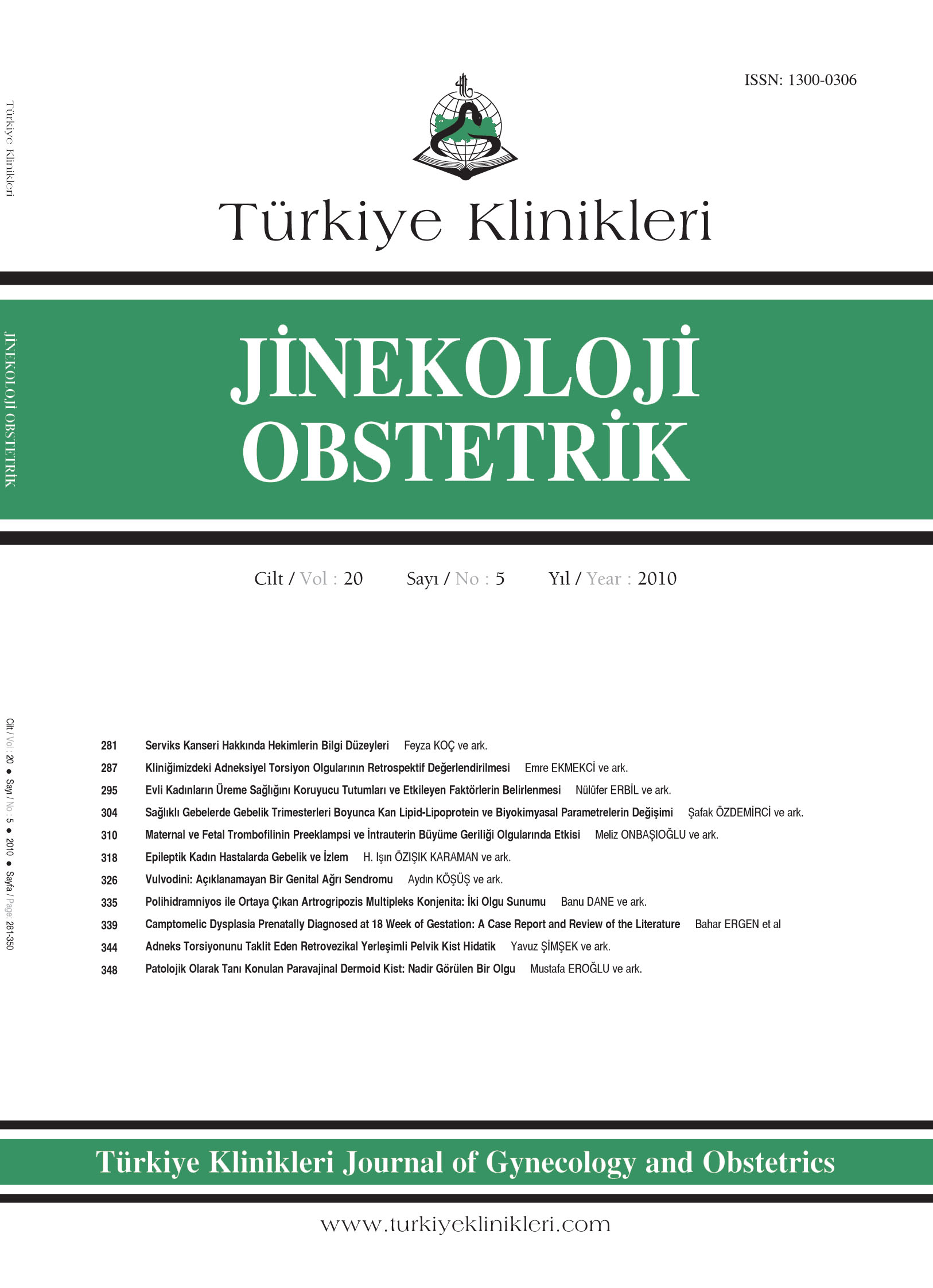Open Access
Peer Reviewed
ORIGINAL RESEARCH
3592 Viewed1535 Downloaded
The Changes of Blood Lipid-Lipoprotein and Biochemical Parameters in Normal Pregnants During Pregnancy Trimesters
Sağlıklı Gebelerde Gebelik Trimesterleri Boyunca Kan Lipid-Lipoprotein ve Biyokimyasal Parametrelerin Değişimi
Turkiye Klinikleri J Gynecol Obst. 2010;20(5):304-9
Article Language: TR
Copyright Ⓒ 2025 by Türkiye Klinikleri. This is an open access article under the CC BY-NC-ND license (http://creativecommons.org/licenses/by-nc-nd/4.0/)
ÖZET
Amaç: Bu çalışmada, rutin gebeliğin izlemi sürecinde; gebelik trimesterlerine göre kan lipid ve lipoprotein, glukoz, üre, total protein, albumin, kalsiyum, hemogram düzeylerinde görülen değişikliklerin tespit edilmesi amaçlandı. Gereç ve Yöntemler: Ocak 2008-Haziran 2009 tarihleri arasında polikliniğe başvuran 200 sağlıklı gebenin gebelik trimesterlerinde serum total kolesterol, trigliserid, glukoz, üre, total protein, albumin, kalsiyum, hemogram düzeylerinde değişimler değerlendirildi. Elli gebe olmayan sağlıklı kadın değerleri kontrol grubu olarak alındı. Bulgular: Gebeliğin 2-3. trimesterinde serum total kolesterol (206.9 ± 44.2 ve 241.9 ± 45.3 mg/dL) ve serum trigliserid [156 (115.5-194.5) ve 218 (165-291.5) mg/dL] seviyesinin aynı gebelerin 1. trimester sonuçlarına [156.1 ± 37.3 ve 89 (64.5-136.5) mg/dL] ve kontrol grubuna [171.5 ± 38.2 ve 92 (56.5-128) mg/dL] göre anlamlı olarak yüksek olduğu saptandı (p< 0.001). Total protein, albumin, hemoglobin, hematokrit ve kalsiyum düzeylerinin ise gebeliğin 2. ve 3. trimesterinde aynı gebelerin 1. trimester sonuçlarına ve kontrol grubuna göre anlamlı olarak azaldığı izlendi. Birinci trimesterdeki gebe kadınlarla kontrol grubu arasında ölçülen parametrelerde anlamlı farklılık saptanmadı. Sonuç: Bu çalışmada gebelik dönemlerinde görülen hiperlipideminin maternal hemostaza yardımcı bir faktör, plasental steroid sentezi ve fetal enerji için kaynak oluşturmaya yönelik olduğu, ek olarak gebeliğin 2. ve 3. trimesterinde görülen değişikliklerin ise özellikle plazma volüm artışına bağlı olduğu sonucuna varılmıştır.
Amaç: Bu çalışmada, rutin gebeliğin izlemi sürecinde; gebelik trimesterlerine göre kan lipid ve lipoprotein, glukoz, üre, total protein, albumin, kalsiyum, hemogram düzeylerinde görülen değişikliklerin tespit edilmesi amaçlandı. Gereç ve Yöntemler: Ocak 2008-Haziran 2009 tarihleri arasında polikliniğe başvuran 200 sağlıklı gebenin gebelik trimesterlerinde serum total kolesterol, trigliserid, glukoz, üre, total protein, albumin, kalsiyum, hemogram düzeylerinde değişimler değerlendirildi. Elli gebe olmayan sağlıklı kadın değerleri kontrol grubu olarak alındı. Bulgular: Gebeliğin 2-3. trimesterinde serum total kolesterol (206.9 ± 44.2 ve 241.9 ± 45.3 mg/dL) ve serum trigliserid [156 (115.5-194.5) ve 218 (165-291.5) mg/dL] seviyesinin aynı gebelerin 1. trimester sonuçlarına [156.1 ± 37.3 ve 89 (64.5-136.5) mg/dL] ve kontrol grubuna [171.5 ± 38.2 ve 92 (56.5-128) mg/dL] göre anlamlı olarak yüksek olduğu saptandı (p< 0.001). Total protein, albumin, hemoglobin, hematokrit ve kalsiyum düzeylerinin ise gebeliğin 2. ve 3. trimesterinde aynı gebelerin 1. trimester sonuçlarına ve kontrol grubuna göre anlamlı olarak azaldığı izlendi. Birinci trimesterdeki gebe kadınlarla kontrol grubu arasında ölçülen parametrelerde anlamlı farklılık saptanmadı. Sonuç: Bu çalışmada gebelik dönemlerinde görülen hiperlipideminin maternal hemostaza yardımcı bir faktör, plasental steroid sentezi ve fetal enerji için kaynak oluşturmaya yönelik olduğu, ek olarak gebeliğin 2. ve 3. trimesterinde görülen değişikliklerin ise özellikle plazma volüm artışına bağlı olduğu sonucuna varılmıştır.
ANAHTAR KELİMELER: Gebelik; lipidler; hemoglobin (64-76); kan proteinleri; albuminler; glukoz; kan üre azotu
ABSTRACT
Objective: In this study, we aimed to investigate the changes in blood lipid, lipoprotein, glucose, urea, albumin, calcium levels and hemogram parameters during routine pregnancy follow-up. Material and Methods: The changes in blood lipid, lipoprotein, glucose, urea, total protein, albumin, calcium levels and hemogram parameters during pregnancy trimesters are evaluated in 200 pregnant patients admitted to the outpatient clinic between january 2008 and june 2009. Nonpregnant 50 healthy women were taken as control group. Result: In second and third trimester; serum total cholesterol (206.9 ± 44.2 and 241.9 ± 45.3 mg/dL), serum trigliserid levels [156 (115.5-194.5) and 218 (165-291.5) mg/dL] are significantly higher compared to first trimester [156.1 ± 37.3 and 89 (64.5-136.5) mg/dL] and control group [171.5 ± 38.2 ve 92 (56.5-128) mg/dL] (p< 0.001). Total protein, albumin hemoglobin, hematocrit and calcium levels are lower compared to first trimester and control group. There were no significant differences between the measured parameters of first trimester pregnancy and control group. Conclusion: In this study, hyperlipidemia during pregnancy was found to be a contributive factor for maternal hemostasis and a source for fetal energy and placental steroid synthesis. In addition, the increase in plasma volume was concluded as the cause of the changes in second and third trimesters of pregnancy.
Objective: In this study, we aimed to investigate the changes in blood lipid, lipoprotein, glucose, urea, albumin, calcium levels and hemogram parameters during routine pregnancy follow-up. Material and Methods: The changes in blood lipid, lipoprotein, glucose, urea, total protein, albumin, calcium levels and hemogram parameters during pregnancy trimesters are evaluated in 200 pregnant patients admitted to the outpatient clinic between january 2008 and june 2009. Nonpregnant 50 healthy women were taken as control group. Result: In second and third trimester; serum total cholesterol (206.9 ± 44.2 and 241.9 ± 45.3 mg/dL), serum trigliserid levels [156 (115.5-194.5) and 218 (165-291.5) mg/dL] are significantly higher compared to first trimester [156.1 ± 37.3 and 89 (64.5-136.5) mg/dL] and control group [171.5 ± 38.2 ve 92 (56.5-128) mg/dL] (p< 0.001). Total protein, albumin hemoglobin, hematocrit and calcium levels are lower compared to first trimester and control group. There were no significant differences between the measured parameters of first trimester pregnancy and control group. Conclusion: In this study, hyperlipidemia during pregnancy was found to be a contributive factor for maternal hemostasis and a source for fetal energy and placental steroid synthesis. In addition, the increase in plasma volume was concluded as the cause of the changes in second and third trimesters of pregnancy.
MENU
POPULAR ARTICLES
MOST DOWNLOADED ARTICLES





This journal is licensed under a Creative Commons Attribution-NonCommercial-NoDerivatives 4.0 International License.










